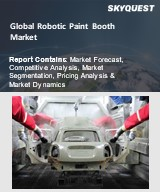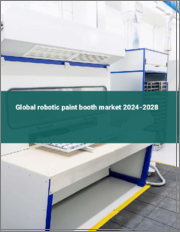
|
시장보고서
상품코드
1800933
로봇 도장 부스 시장 보고서 : 유형별, 제품 유형별, 컴포넌트별, 유통별, 용도별, 지역별(2025-2033년)Robotic Paint Booth Market Report by Type, Product Type, Component, Distribution, Applications, and Region 2025-2033 |
||||||
로봇 도장 부스 세계 시장 규모는 2024년 40억 달러에 달했습니다. 향후 IMARC 그룹은 2033년까지 시장 규모가 76억 달러에 달하고, 2025-2033년 연평균 성장률(CAGR)은 7.05%를 보일 것으로 전망하고 있습니다.
로봇 도장 부스는 도장, 밑칠, 베이스코팅, 클리어코팅, 마감코팅 등 다양한 도장 기능을 수행하는 기계장치입니다. 또한, 수성, 용제성, 분말성 물질을 스프레이로 토출하는 데에도 활용됩니다. 도장 부스에서는 복잡한 부품, 곡선, 오목한 부분, 모든 크기의 형상을 효율적으로 커버할 수 있습니다. 효율적으로 프로그래밍된 로봇은 다양한 두께의 복잡한 스프레이 패턴을 균일하게 도포하면서 최적의 마감 품질을 속도와 정밀도로 제공할 수 있습니다. 최종 사용자는 운영 비용 절감, 폐기물 발생, 유해한 휘발성 유기화합물(VOC) 배출로 인한 인체 노출 등의 장점으로 인해 로봇식 도장 부스를 선호하고 있습니다.
다양한 산업에서 자동화 생산 기술이 채택되고 로봇 공학의 활용이 증가함에 따라 시장 성장을 가속하는 주요 요인 중 하나가 되고 있습니다. 이 장비는 전체 공정의 속도를 높이고, 비용 효율성을 향상시키며, 오류의 위험을 줄입니다. 또한, 로봇 도장 부스는 사용자 정의가 가능하고 교육 비용이 낮기 때문에 제품 수요가 크게 증가하고 있습니다. 또한, 방위산업과 자동차 산업의 지출 증가는 또 다른 주요 성장 촉진요인으로 작용하고 있습니다. 방위산업에서는 다양한 부품이 이 기술을 사용하여 위장하고 있습니다. 한편, 자동차 산업에서는 폐기물을 최소화하면서 고품질의 일관된 먼지가 없는 도장으로 자동차 외관과 내장을 도장하는 데 사용되고 있습니다. 또한, 자동 학습 프로그래밍과 같은 기술 발전도 시장 성장을 가속하고 있습니다. 로봇이 작업자의 움직임을 기록, 기억하고 도장 중에 이를 완벽하게 재현할 수 있기 때문입니다.
본 보고서에서 다룬 주요 질문
- 세계 로봇 도장 부스 시장은 지금까지 어떻게 성장해 왔으며, 향후 몇 년 동안 어떻게 변화할 것인가?
- 주요 지역 시장은?
- 코로나19가 세계 로봇 도장 부스 시장에 미치는 영향은?
- 유형별 시장 분석은?
- 제품 유형별 시장 분석은?
- 구성요소별 시장 분석은?
- 유통별 시장 분석은?
- 용도별 시장 분석은?
- 산업 가치사슬의 다양한 단계는?
- 업계의 주요 촉진요인과 과제는?
- 세계 로봇 도장 부스 시장 구조와 주요 기업은?
- 업계 내 경쟁은 어느 정도인가?
목차
제1장 서문
제2장 조사 범위와 조사 방법
- 조사 목적
- 이해관계자
- 데이터 소스
- 1차 정보
- 2차 정보
- 시장 추정
- 보텀업 접근
- 톱다운 접근
- 조사 방법
제3장 주요 요약
제4장 서론
제5장 세계의 로봇 도장 부스 시장
- 시장 개요
- 시장 실적
- COVID-19의 영향
- 시장 예측
제6장 시장 분석 : 유형별
- 방폭형
- 비방폭형
제7장 시장 분석 : 제품 유형별
- 코팅 부스
- 코팅 부스 로봇
제8장 시장 분석 : 컴포넌트별
- 하드웨어
- 소프트웨어
- 서비스
제9장 시장 분석 : 유통별
- 직접 판매
- 간접 판매
제10장 시장 분석 : 용도별
- 자동차 용도
- 비자동차 용도
제11장 시장 분석 : 지역별
- 북미
- 미국
- 캐나다
- 아시아태평양
- 중국
- 일본
- 인도
- 한국
- 호주
- 인도네시아
- 기타
- 유럽
- 독일
- 프랑스
- 영국
- 이탈리아
- 스페인
- 러시아
- 기타
- 라틴아메리카
- 브라질
- 멕시코
- 기타
- 중동 및 아프리카
제12장 SWOT 분석
제13장 밸류체인 분석
제14장 Porter의 Five Forces 분석
제15장 경쟁 구도
- 시장 구조
- 주요 기업
- 주요 기업 개요
- ABB Ltd
- Durr AG
- Eisenmann SE
- FANUC Corporation
- Giffin Inc.
- Kawasaki Heavy Industries Ltd.
- Staubli International AG
- Yaskawa Electric Corporation
The global robotic paint booth market size reached USD 4.0 Billion in 2024. Looking forward, IMARC Group expects the market to reach USD 7.6 Billion by 2033, exhibiting a growth rate (CAGR) of 7.05% during 2025-2033.
A robotic paint booth is a mechanical device that performs various painting functions such as applying primer, and base, clear and finish coats. It is also utilized for spray dispensing water-, solvent- and powder-based materials. Paint booths can efficiently cover intricate parts, curves, recesses and shapes of all sizes. An efficiently programmed robot can evenly apply complex spray patterns with varying film thickness while delivering optimum finish quality with speed and accuracy. The end users are preferring robotic paint booths owing to benefits including reduced operational costs, waste generation and human exposure to harmful volatile organic compound (VOC) emissions.
The rising utilization of robotics, along with the adoption of automated production technology across various industries, is one of the key factors driving the growth of the market. This equipment makes the overall process faster and cost-effective, while reducing the risk of errors. Furthermore, robotic paint booths are highly customizable and involve low training costs, owing to which there is a significant increase in product demand. Additionally, increasing expenditure in the defense and automotive industries is acting as another major growth-inducing factor. In the defense industry, various components are camouflaged using this technology. While in the automotive industry, it is used to paint the exterior body and interiors of vehicles with quality and consistent dust-free painting, while generating minimal waste. Moreover, technological advancements such as auto-learning programming are also favoring the market growth, as it enables robots to record and memorize the operator's movements and then replicate them with perfection while painting.
Key Market Segmentation:
Breakup by Type:
- Explosion Proof Type
- Non-Explosion Proof Type
Breakup by Product Type:
- Paint Booth
- Paint Booth Robots
Breakup by Component:
- Hardware
- Software
- Services
Breakup by Distribution:
- Direct Sales
- Indirect Sales
Breakup by Applications:
- Automotive Applications
- Non-Automotive Applications
Breakup by Region:
- North America
- United States
- Canada
- Asia Pacific
- China
- Japan
- India
- South Korea
- Australia
- Indonesia
- Others
- Europe
- Germany
- France
- United Kingdom
- Italy
- Spain
- Russia
- Others
- Latin America
- Brazil
- Mexico
- Others
- Middle East and Africa
Competitive Landscape:
The report has also analysed the competitive landscape of the market with some of the key players being ABB Ltd, Durr AG, Eisenmann SE, FANUC Corporation, Giffin Inc., Kawasaki Heavy Industries Ltd., Staubli International AG, Yaskawa Electric Corporation, etc.
Key Questions Answered in This Report:
- How has the global robotic paint booth market performed so far and how will it perform in the coming years?
- What are the key regional markets?
- What has been the impact of COVID-19 on the global robotic paint booth market?
- What is the breakup of the market based on the type?
- What is the breakup of the market based on the product type?
- What is the breakup of the market based on the component?
- What is the breakup of the market based on the distribution?
- What is the breakup of the market based on the applications?
- What are the various stages in the value chain of the industry?
- What are the key driving factors and challenges in the industry?
- What is the structure of the global robotic paint booth market and who are the key players?
- What is the degree of competition in the industry?
Table of Contents
1 Preface
2 Scope and Methodology
- 2.1 Objectives of the Study
- 2.2 Stakeholders
- 2.3 Data Sources
- 2.3.1 Primary Sources
- 2.3.2 Secondary Sources
- 2.4 Market Estimation
- 2.4.1 Bottom-Up Approach
- 2.4.2 Top-Down Approach
- 2.5 Forecasting Methodology
3 Executive Summary
4 Introduction
- 4.1 Overview
- 4.2 Key Industry Trends
5 Global Robotic Paint Booth Market
- 5.1 Market Overview
- 5.2 Market Performance
- 5.3 Impact of COVID-19
- 5.4 Market Forecast
6 Market Breakup by Type
- 6.1 Explosion Proof Type
- 6.1.1 Market Trends
- 6.1.2 Market Forecast
- 6.2 Non-Explosion Proof Type
- 6.2.1 Market Trends
- 6.2.2 Market Forecast
7 Market Breakup by Product Type
- 7.1 Paint Booth
- 7.1.1 Market Trends
- 7.1.2 Market Forecast
- 7.2 Paint Booth Robots
- 7.2.1 Market Trends
- 7.2.2 Market Forecast
8 Market Breakup by Component
- 8.1 Hardware
- 8.1.1 Market Trends
- 8.1.2 Market Forecast
- 8.2 Software
- 8.2.1 Market Trends
- 8.2.2 Market Forecast
- 8.3 Services
- 8.3.1 Market Trends
- 8.3.2 Market Forecast
9 Market Breakup by Distribution
- 9.1 Direct Sales
- 9.1.1 Market Trends
- 9.1.2 Market Forecast
- 9.2 Indirect Sales
- 9.2.1 Market Trends
- 9.2.2 Market Forecast
10 Market Breakup by Applications
- 10.1 Automotive Applications
- 10.1.1 Market Trends
- 10.1.2 Market Forecast
- 10.2 Non-Automotive Applications
- 10.2.1 Market Trends
- 10.2.2 Market Forecast
11 Market Breakup by Region
- 11.1 North America
- 11.1.1 United States
- 11.1.1.1 Market Trends
- 11.1.1.2 Market Forecast
- 11.1.2 Canada
- 11.1.2.1 Market Trends
- 11.1.2.2 Market Forecast
- 11.1.1 United States
- 11.2 Asia Pacific
- 11.2.1 China
- 11.2.1.1 Market Trends
- 11.2.1.2 Market Forecast
- 11.2.2 Japan
- 11.2.2.1 Market Trends
- 11.2.2.2 Market Forecast
- 11.2.3 India
- 11.2.3.1 Market Trends
- 11.2.3.2 Market Forecast
- 11.2.4 South Korea
- 11.2.4.1 Market Trends
- 11.2.4.2 Market Forecast
- 11.2.5 Australia
- 11.2.5.1 Market Trends
- 11.2.5.2 Market Forecast
- 11.2.6 Indonesia
- 11.2.6.1 Market Trends
- 11.2.6.2 Market Forecast
- 11.2.7 Others
- 11.2.7.1 Market Trends
- 11.2.7.2 Market Forecast
- 11.2.1 China
- 11.3 Europe
- 11.3.1 Germany
- 11.3.1.1 Market Trends
- 11.3.1.2 Market Forecast
- 11.3.2 France
- 11.3.2.1 Market Trends
- 11.3.2.2 Market Forecast
- 11.3.3 United Kingdom
- 11.3.3.1 Market Trends
- 11.3.3.2 Market Forecast
- 11.3.4 Italy
- 11.3.4.1 Market Trends
- 11.3.4.2 Market Forecast
- 11.3.5 Spain
- 11.3.5.1 Market Trends
- 11.3.5.2 Market Forecast
- 11.3.6 Russia
- 11.3.6.1 Market Trends
- 11.3.6.2 Market Forecast
- 11.3.7 Others
- 11.3.7.1 Market Trends
- 11.3.7.2 Market Forecast
- 11.3.1 Germany
- 11.4 Latin America
- 11.4.1 Brazil
- 11.4.1.1 Market Trends
- 11.4.1.2 Market Forecast
- 11.4.2 Mexico
- 11.4.2.1 Market Trends
- 11.4.2.2 Market Forecast
- 11.4.3 Others
- 11.4.3.1 Market Trends
- 11.4.3.2 Market Forecast
- 11.4.1 Brazil
- 11.5 Middle East and Africa
- 11.5.1 Market Trends
- 11.5.2 Market Breakup by Country
- 11.5.3 Market Forecast
12 SWOT Analysis
- 12.1 Overview
- 12.2 Strengths
- 12.3 Weaknesses
- 12.4 Opportunities
- 12.5 Threats
13 Value Chain Analysis
14 Porters Five Forces Analysis
- 14.1 Overview
- 14.2 Bargaining Power of Buyers
- 14.3 Bargaining Power of Suppliers
- 14.4 Degree of Competition
- 14.5 Threat of New Entrants
- 14.6 Threat of Substitutes
15 Competitive Landscape
- 15.1 Market Structure
- 15.2 Key Players
- 15.3 Profiles of Key Players
- 15.3.1 ABB Ltd
- 15.3.1.1 Company Overview
- 15.3.1.2 Product Portfolio
- 15.3.1.3 Financials
- 15.3.1.4 SWOT Analysis
- 15.3.2 Durr AG
- 15.3.2.1 Company Overview
- 15.3.2.2 Product Portfolio
- 15.3.2.3 Financials
- 15.3.2.4 SWOT Analysis
- 15.3.3 Eisenmann SE
- 15.3.3.1 Company Overview
- 15.3.3.2 Product Portfolio
- 15.3.4 FANUC Corporation
- 15.3.4.1 Company Overview
- 15.3.4.2 Product Portfolio
- 15.3.4.3 Financials
- 15.3.4.4 SWOT Analysis
- 15.3.5 Giffin Inc.
- 15.3.5.1 Company Overview
- 15.3.5.2 Product Portfolio
- 15.3.6 Kawasaki Heavy Industries Ltd.
- 15.3.6.1 Company Overview
- 15.3.6.2 Product Portfolio
- 15.3.6.3 Financials
- 15.3.6.4 SWOT Analysis
- 15.3.7 Staubli International AG
- 15.3.7.1 Company Overview
- 15.3.7.2 Product Portfolio
- 15.3.8 Yaskawa Electric Corporation
- 15.3.8.1 Company Overview
- 15.3.8.2 Product Portfolio
- 15.3.8.3 Financials
- 15.3.1 ABB Ltd


















